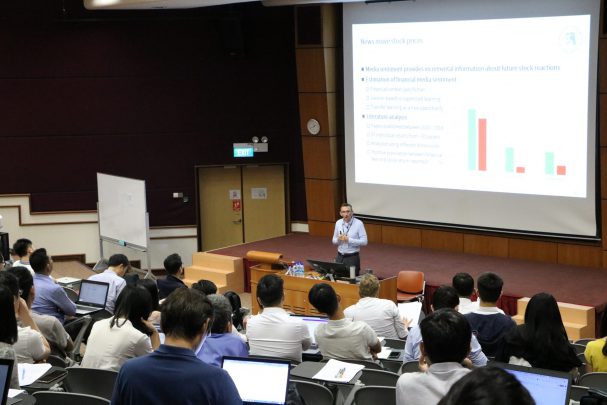| |
RMI Co-Hosts the Workshop on AI Powered Sentiment Analysis – NLP, Data Science and Others
|
|
|
| |
On 14 November 2019, RMI co-organized the “Workshop on AI Powered Sentiment Analysis – NLP, Data Science and Others” along with NUS’s Department of Mathematics and Centre for Quantitative Finance. Attended by over 150 participants from academia as well as industry, the workshop featured six presentations by academics from NUS, Singapore Institute of Management (SMU), Humboldt-Universität zu Berlin (HU Berlin), and Deutsch Bank AG. The workshop fostered a great environment for researchers, industry professional, and students to interact, share ideas, and engage in discussions on the future of AI, data science and related topics.
|
|
| |
An Interview with Prof. Dr. Martin Hellwig
|
|
|
| |
In July 2019, Professor Martin Hellwig was invited to RMI to give a keynote lecture at the Thirteenth Annual Risk Management Conference and visit with RMI’s staff and students. During his visit he also hosted a seminar on the subject of Banks, Governments, and the ECB in the ‘Euro Crisis’. During the two-hour speech, Prof. Hellwig took the audience back to review the causes and development of the Euro crisis, and also discussed the role of the European Central Bank (ECB) in the past and the dilemmas it faced. After the speech, Prof. Hellwig met with NUS MFE students and RMI staff to discuss in depth the issue of the Eurozone economy and gave insights into his career and personal inspiration. Below is a small snippet from his chats.
Q: You mentioned that interest rates at or below zero are problematic. So do you think there is better action that ECB can take other than lowering interest rates? A: First, it is not clear to what extent long-term interest rates reflect the evolution of the real economy and to what extent they reflect monetary policy. Some economists claim that equilibrium long-run interest rates are actually negative because many people are saving and holding assets to provide for old age and real investment of firms had slowed so that, at positive interest rates, it is too small to absorb savings. This theory is in line with the observation that the enormous money creation of central banks has not caused any serious inflation. Perhaps this money creation has merely provided additional paper assets in which to hold savings.
|
|
| |
Should Cyber Risk Governance take Centre-Stage in Financial Services?
|
|
|
| |
Based on the authors remarks at the World Economic Forum Annual Meeting on Cybersecurity, 12-13 November 2019 where he chaired two sessions. It feels as though cyber risk has crept up on us without warning and with great intensity. We have come a long way from the days when our palm pilots had to be hot-sync’d through a docking station and the occasional hazard was from viruses transmitted as email attachments. Over the years, we have embraced extreme connectivity combined with extreme automation in a never-ending drive towards convenience and cost-efficiency. However, even as banks continue to nudge, cajole (and perhaps occasionally threaten) their customers towards impersonal e-channels, we learn about record amounts of losses from online fraud and theft. Furthermore, all of us – not just the specialists - are asked to act as conscription soldiers in the fight against this threat. According to a report by Accenture, almost eight out of ten business leaders believe that they are adopting new technologies faster than they can address related security issues. It also estimates that nearly $350 billion of value could be lost by the banking sector to cybercrime in the next five years.
|
|
| |
Prof. Chen Kan, is jointly appointed as Professor (practice track) with RMI (starting 15 November 2019) and the Department of Mathematics. He has also been appointed as Deputy Director for Industry at RMI, strating 1 December 2019. He was a Portfolio Manager at Capstone (2015-2018) and WorldQuant (2013-2015) , trading systematic equity strategies. Before that he was an Executive Director at JP Mogran's global equity prop trading desk. While at JP Morgan, he managed the quantitative principal strategy (QPS) group running multiple strategies in global markets. He moved to CreditEase (Beijing) last year, managing CreditEase's capital market FoF business as well as developing quantitative strategies for trading Chinese equity market. Before moving to the financial industry, he was assistant/(tenured) associate professor in NUS in 1992-2006, teaching computational science and physics. He also held administrative positions in NUS as Acting Head/Deputy Head of the Department of Computational Science and Deputy Director of the Institute for Mathematical Sciences (a university-level institute). He got his BSc in Physics from University of Science and Technology of China in 1983 and his PhD in Physics from Ohio State University in 1988. He has published papers in top journals such as Nature and Physical Review Letters.
|
|
| |
Prof. Yeh Jin-Huei is visiting RMI CRI as a Visiting Professor from 2 September 2019 to 1 September 2020. Prof. Yeh received his PhD in Economics from National Taiwan University. He was the chairperson of the Department of Finance at National Central University (NCU) and has been a visiting scholar at Booth School of Business, University of Chicago. His primary research interests focused around Econometric Theory and Applications, Empirical Asset Pricing, Risk Modelling and Management, Policy Design and Evaluation, Data Science for Intelligent Decision Making.
|
|
|
| |
|
IMS Program on Quantitative Finance Workshop 2 and 3
August 2019
|
|
|
IBF Standards Certificate in Operational Risk Management
12 October to 18 November 2019
|
|
MFE Career Development Events
October & November 2019
|
|
|
|
|
| |
1 October 2019 to 15 March 2020
Application for the Master of Science in Financial Engineering Program - August 2020 Intake
Read more » 4 January to 2 May 2020
Financial Risk Manager (FRM®)Certification Training Program 2020 January Intake
Read more » 24 February to 29 April 2020
NUS RMI Specialist Diploma in Credit Risk Management – Corporate Banking
Read more »
|
|
|




